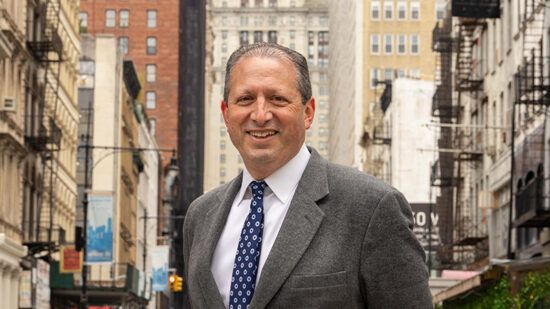Voluntary net-zero carbon emission targets for finance firms are no longer enough, a panel at the City Week 2022 conference heard on Monday in London.
Patrick Arber, group head of government engagement – sustainability at Aviva, was speaking in a discussion on aligning portfolios with the Paris Agreement.
He said he backed the newly formed UK Transition Plan Taskforce (TPT) in bringing in mandatory net-zero targets for financial services companies: “Where we would strongly encourage [TPT] to go is to say it’s not enough to do this on a voluntary basis anymore. Time is ticking. We don’t have time left anymore and we need to bring the entire financial system in to play here.”
Arber told delegates at the City & Financial Global event to engage with government in a way that encourages them and helps them to be ambitious and praises them when they are.
He also warned environmental regulation should not be dismissed as being excessive. Traditionally, the financial service industry has been prone to assuming all regulation from government is “wrong and gets in the way of industry,” Arber commented.
“I think that’s absolutely the wrong way to look at this kind of environmental regulation because just as we’ve described, it’s a huge cross-cutting issue where none of us alone can make the impact that we desire, and so we have to do it collectively,” he said.
The TPT was launched on Monday and will help firms decarbonise as part of the country’s commitment to become the ‘world’s first net zero-aligned financial centre’.
Chancellor, Rishi Sunak, announced at COP26 in November the UK would be making disclosure of net-zero transition plans mandatory for UK financial institutions and listed companies.
Arber described moving net-zero targets from voluntary to compulsory as one of the “explicit” aims of the TPT.
He also explained Aviva is supportive of getting everyone to the same level on net-zero targets because it is a “long-term investor” that is “not going to survive on a 3°C [or] 4°C planet”.
Therefore, he said, leakage of carbon emissions from firms and companies achieving best practice to those with low standards must be tackled with effective government policy and regulation.
No offsetting ecosystems
As attention turns from mitigating climate change to preserving biodiversity, or, more accurately, to combining the two, investments in nature solutions are set to increase fourfold by 2050, according to Elizabeth Maruma Mrema, executive secretary of the Convention on Biological Diversity and co-chair of Taskforce on Nature-related Financial Disclosure (TNFD).
But, during a separate panel event at City Week this year, Natural capital: progress towards nature-based financial disclosures, she added the private sector is only contributing 14% towards these.
Discussing some of the barriers to more private finance involvement on the panel were Margaret Kuhlow, global finance practice Leader at WWF International; Dr Richard Mattison, president at S&P Global Sustainable; Mark Napier, CEO of FSD Africa; and David Craig, co-chair of the TNFD.
“We need to get better at valuing the worth of keeping ecosystems intact and restoring them,” said Mattison, adding investors should be collecting information about how businesses interact with nature, and compiling and analysing that information.
The TNFD has, of course, been set up to help investors with just that. In terms of what the TNFD will recommend, Craig said there will be a set of numbers to report on, like the TCFD, but that it’s more important that nature-based impacts are looked at more holistically.
“You have to understand what you’re doing, but more importantly where you’re doing it,” he added. “If you release emissions, it doesn’t really matter where… but nature ecosystems don’t work like that. You can’t offset water use in one area with another. So you need to map out where everything operates and analyse that… The real challenge will be in upstream operations [supply chains]… and eventually your downstream operations [distribution] as well.”
To ensure the TNFD does not become a box-ticking exercise for investors, Napier suggested three things. The first is deal acceleration – making sure nature-based risks are being incorporated across the chain of investment. The second is advocacy, including forming investor alliances. And the third is making sure to invest in large and complex processes to ensure real-world impact.
Napier gave an example of working with the Lagos government on flood resilience, which involves a host of players. “We’re putting in place a framework so we can then help price flood risk for the insurance sectors,” he said.
“So it’s large and complex but that’s what we need to be investing in.”








